外研版八年级英语上册 Module1How to learn English模块复习课件(共49张PPT)
文档属性
| 名称 | 外研版八年级英语上册 Module1How to learn English模块复习课件(共49张PPT) | 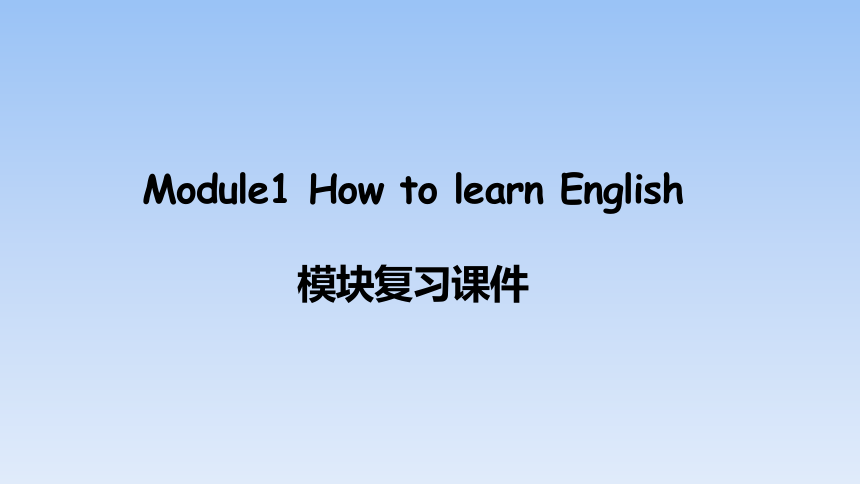 | |
| 格式 | pptx | ||
| 文件大小 | 198.8KB | ||
| 资源类型 | 教案 | ||
| 版本资源 | 外研版 | ||
| 科目 | 英语 | ||
| 更新时间 | 2022-06-23 17:42:10 | ||
图片预览

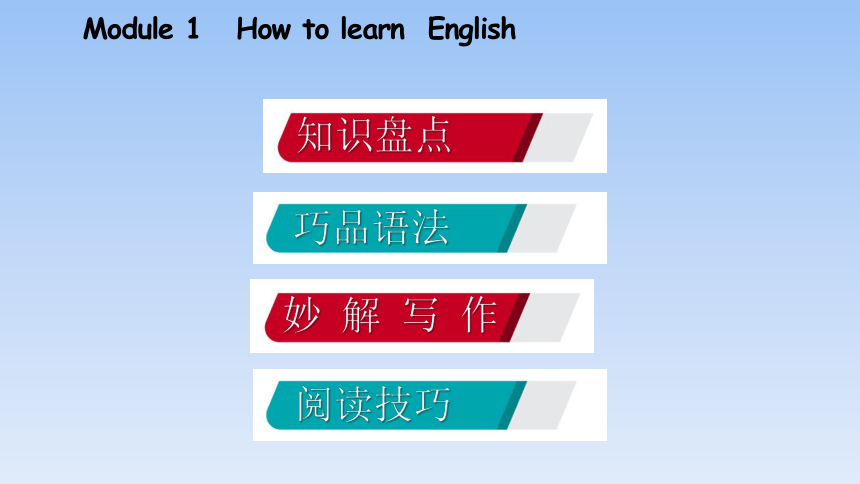
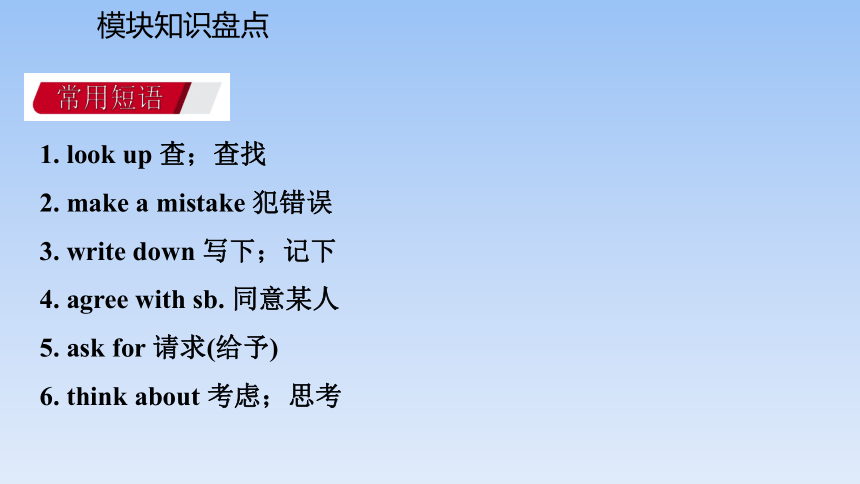
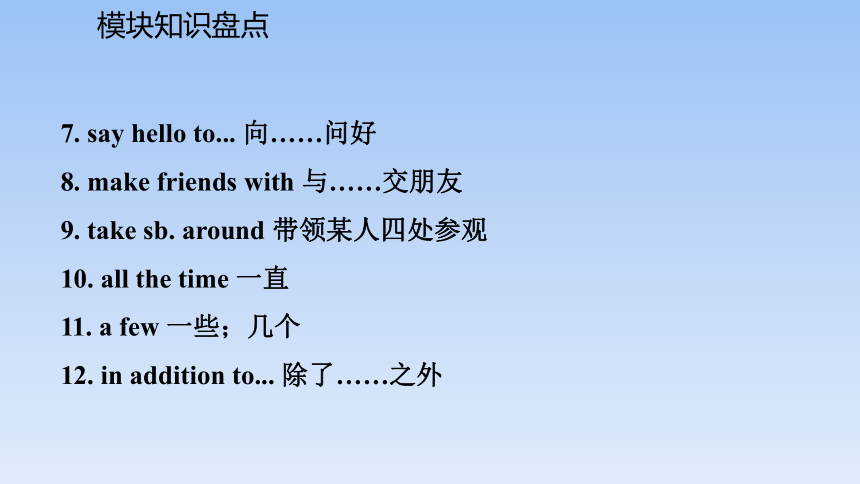
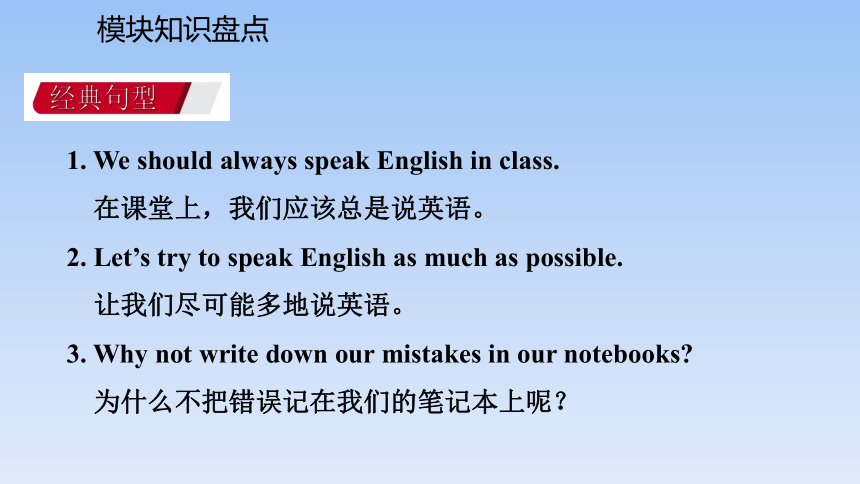
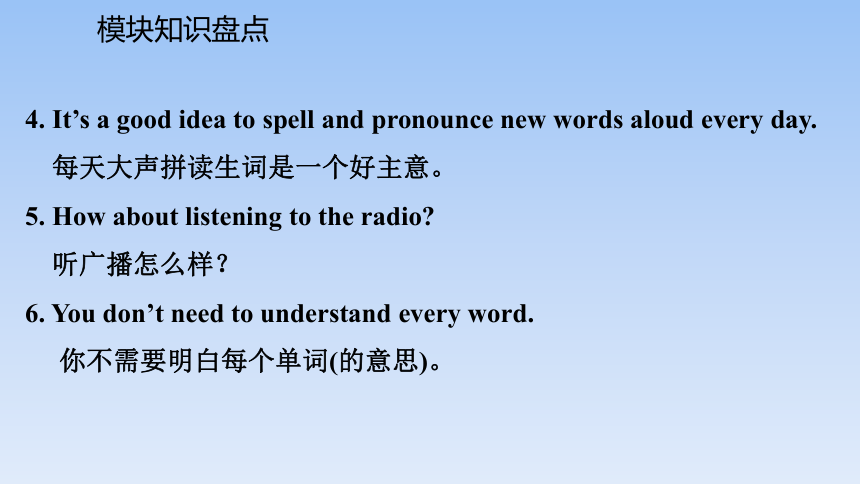
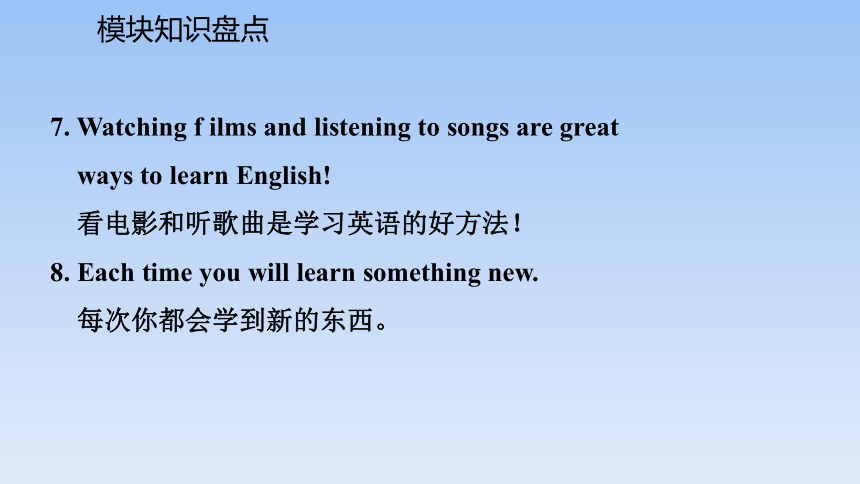
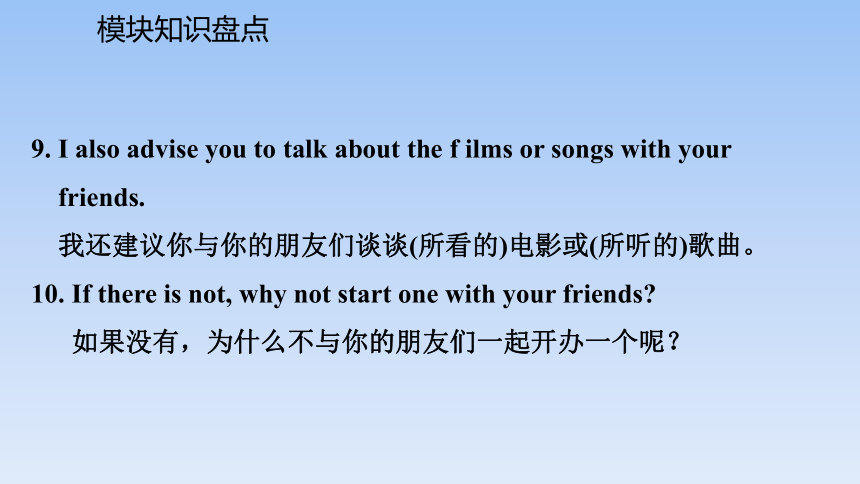
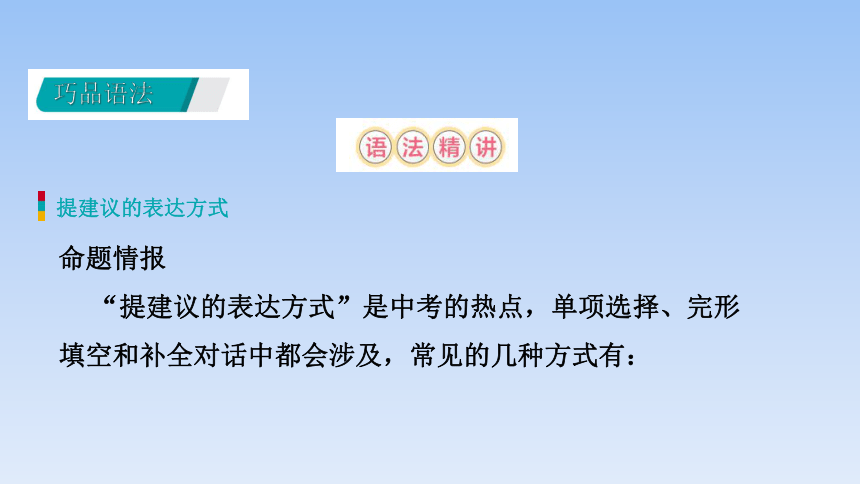
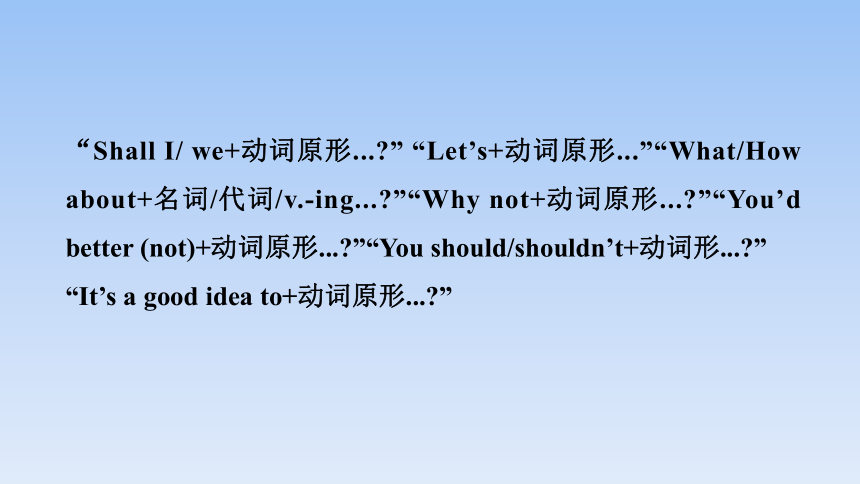
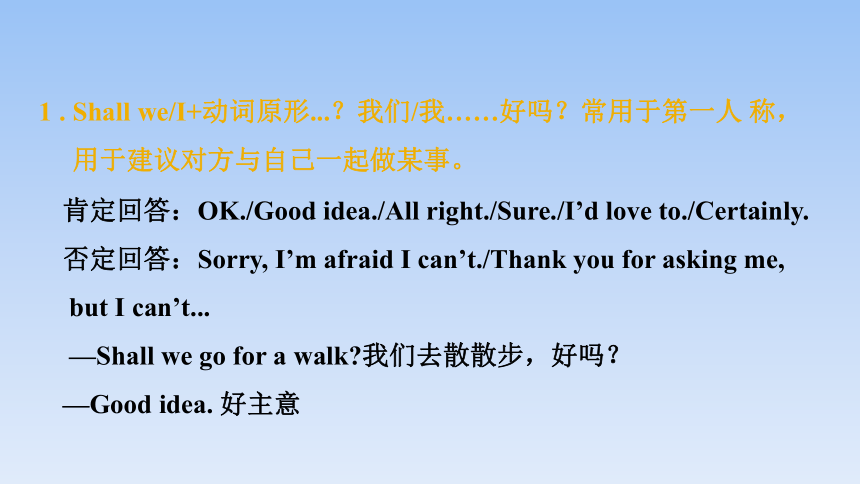

文档简介
(共49张PPT)
Module1 How to learn English
模块复习课件
Module 1 How to learn English
巧品语法
妙 解 写 作
阅读技巧
知识盘点
常用短语
模块知识盘点
1. look up 查;查找
2. make a mistake 犯错误
3. write down 写下;记下
4. agree with sb. 同意某人
5. ask for 请求(给予)
6. think about 考虑;思考
模块知识盘点
7. say hello to... 向……问好
8. make friends with 与……交朋友
9. take sb. around 带领某人四处参观
10. all the time 一直
11. a few 一些;几个
12. in addition to... 除了……之外
经典句型
1. We should always speak English in class.
在课堂上,我们应该总是说英语。
2. Let’s try to speak English as much as possible.
让我们尽可能多地说英语。
3. Why not write down our mistakes in our notebooks
为什么不把错误记在我们的笔记本上呢?
模块知识盘点
4. It’s a good idea to spell and pronounce new words aloud every day.
每天大声拼读生词是一个好主意。
5. How about listening to the radio
听广播怎么样?
6. You don’t need to understand every word.
你不需要明白每个单词(的意思)。
模块知识盘点
模块知识盘点
7. Watching f ilms and listening to songs are great
ways to learn English!
看电影和听歌曲是学习英语的好方法!
8. Each time you will learn something new.
每次你都会学到新的东西。
模块知识盘点
9. I also advise you to talk about the f ilms or songs with your
friends.
我还建议你与你的朋友们谈谈(所看的)电影或(所听的)歌曲。
10. If there is not, why not start one with your friends
如果没有,为什么不与你的朋友们一起开办一个呢?
巧品语法
提建议的表达方式
命题情报
“提建议的表达方式”是中考的热点,单项选择、完形
填空和补全对话中都会涉及,常见的几种方式有:
“Shall I/ we+动词原形... ” “Let’s+动词原形...”“What/How about+名词/代词/v.-ing... ”“Why not+动词原形... ”“You’d better (not)+动词原形... ”“You should/shouldn’t+动词形... ”
“It’s a good idea to+动词原形... ”
1 . Shall we/I+动词原形...?我们/我……好吗?常用于第一人 称,
用于建议对方与自己一起做某事。
肯定回答:OK./Good idea./All right./Sure./I’d love to./Certainly.
否定回答:Sorry, I’m afraid I can’t./Thank you for asking me,
but I can’t...
—Shall we go for a walk 我们去散散步,好吗?
—Good idea. 好主意
Let’s+动词原形... 让我们……吧。
Let’s go and see the tiger.
让我们去看看老虎吧。
3 . What/How about+名词/代词/v.-ing... ……怎么样?
用来征求对方的意见。
I would like some juice. What about you
我想喝一些果汁,你呢?
How about playing basketball 打篮球怎么样?
4. Why not+动词原形... = Why don’t you+动词原形...
表示向对方提出建议或询问某种原因。
Why not come a little earlier =Why don’t you come a little earlier
(你)为什么不来早点呢?
5 . You’d better (not) +动词原形...
你最好(不要)……
You’d better finish your homework on time.
你最好按时完成家庭作业。
6. You should/shouldn’t+动词原形...
你应该/不应该……
You should answer my question in English.
你应该用英语回答我的问题。
7. It’s a good idea to+动词原形...
做……是一个好主意。
it是形式主语,动词不定式是真正的主语。
It’s a good idea to make a cake for him.
给他做一个蛋糕是一个好主意。
一般现在时、一般过去时和一般将来时
命题情报
历年中考中对动词时态的考查非常多。这一模块我们
主要复习一下一般现在时、一般过去时和一般将来时。主
要集中在单项选择、完形填空、词汇填空、完成句子、短
文填空等试题中。
模块专题聚焦
1. 一般现在时:⑴ 主语+be动词(am, is, are)+其他.
⑵主语+动词原形/第三人称单数+其他.
标志词 频率副词always, often, usually, sometimes等。
用法 (1)表示身份或现在的状况。
I am a student. 我是一名学生。
(2)表示经常性或习惯性的动作。
I always get up at six o’clock.
我总是六点钟起床。
(3)表示客观真理或事实。
The sun is bigger than the moon. 太阳比月亮大。
(4)用在时间或条件状语从句中。
I’ll tell you if he comes tomorrow.
如果他明天来,我会告诉你的。
2.一般过去时:⑴ 主语+be动词(was, were)+其他.
⑵主语+动词的过去式+其他.
标志词 just now, ago, in+过去的时间, in the past,
last week, the other day等
用法 表示过去某个时间发生的动作或存在的状态。
I was born in Liuzhou.
我出生在柳州。
He visited his aunt last weekend.
他上周末去看他的姨妈了。
3.一般将来时:⑴ 主语+be going to+动词原形+其他.
⑵主语+will+动词原形+其他.
标志词 tomorrow, next week, in+将来的时间, in the future等。
用法 (1)“be(am/is/are)+going+to+动词原形”表示说话人的意图、打算或某种可能性。
He is going to have a piano lesson this weekend.
这周末他打算去上钢琴课。
(2)“will+动词原形”表示未来要发生的事或对将来的预测。
It will probably be hot all year. 可能整年都会热。
谈论英语学习
本模块的话题是谈论“英语学习”,该话题在中考中较为常见,它贴近学生生活,与学生的日常学习息息相关。该话题类别较为丰富,其中以“介绍学习方法”和“分享学习经验”最为常见。现在,就让我们一起结合实例来看看此类文章的写作技巧吧!
妙 解 写 作
写 作 案 例
假如你是你们班英语成绩最优秀的学生,受老师和同学们的邀请,你将做一个题为“How to Learn English Well”的演讲,请根据下面的内容提示写一篇70词左右的英语短文来介绍你学习英语的方法。
内容提示:
1.每天多花一点时间学英语;
2.尽可能多地记忆英语单词并在日常生活中使用它们;
3.经常读英语书、杂志或报纸;
4.听或唱英文歌曲等。
素 材 积 累
词汇库
spelling 拼写 sentence 句子 grammar 语法
pronounce 发……的音 vocabulary 词汇 important 重要的
helpful 有帮助的 daily 日常的
短语箱
give sb. some advice 给某人一些建议
as much as... 和……一样多
write down 写下
look up 查找
as...as possible 尽可能……地
句式链
① Why not ... 为什么不……呢?
② We mustn’t/can’t do... 我们禁止/不能做……
③ It’s+adj.+for sb. to do sth. 做某事对某人来说是……的。
五 步 妙 解
体裁 应用文 话题 介绍学习英语的方法
时态 一般现在时 人称 第一、二人称
段落 布局 开头:如何学好英语。 主体:经常读英语书、杂志或报纸,听或唱英文歌曲等。 结尾:祝愿
审
(1) I am very glad to share my ideas. How to learn English well.
用介词on把以上两个句子合并为一个句子:
_____________________________________________
谴
I am very glad to share my ideas on how to learn English well.
(2)听或唱英文歌曲可以使你对英语学习更感兴趣。
汉译英:
①听或唱英文歌曲:__________________________________
②使你对英语学习更感兴趣:________________________________
翻译此句 ________________________________________________
________________
listen to or sing English songs
make you more interested in English learning
Listening to or singing English songs can make you more interested
in English learning.
开篇点题
具体措施
结尾
(祝愿)
...we should spend some time learning English every day.
It’s important for us to remember as many English words as possible. We
should try to use English words in our daily life.
Listening to or singing English songs can make you more interested in English.
I hope my advice can be helpful to your English learning.
模
I’m very glad to share my ideas on how to learn English well with you.
..why not read some English books, magazines or newspapers
How to Learn English Well
I’m very glad to share my ideas on how to learn English well with you.
I think we should spend some time learning English every day. It’s important for us to remember as many English words as possible. We should try to use English words in our daily life.
润
When we are free, why not read some English books, magazines or newspapers Listening to or singing English songs can make you more interested in English.
I hope my advice can be helpful to your English learning.
1. 该篇演讲稿主题鲜明,条理清晰。开篇点明了演讲的主题,接
着就如何学习英语提出自己的建议,最后表达了演讲者的祝愿。
2. 全文句式丰富,多次使用了本模块所学的提建议的句型,如
“should+动词原形”,
“Why not/Why don’t you+动词原形... ”等。
点
小 试 身 手
假设你是Mary,你的笔友李华来信向你询求关于“How to Be a Good Learner”的建议。请根据以下提示给李华写一封70词左右的回信。
其他:1—2条
study in groups,
help each other
habit, way
get ready, listen
get ready, listen
work hard, do sports
How to Be a Good Learner
Dear Li Hua,
One possible version:
Dear Li Hua,
Thanks for your letter. To be a good learner, we should have good habits and ways of learning. We need to get ready for our lessons before class and always listen carefully in class. After class, we must go over the lessons and finish our homework on time. It's good to study in groups and help each other. As a student, working hard is important. But don't forget to do sports and keep healthy. We should do more reading in our free time. If we have some problems, we'd better ask others for help. I think all these will be helpful to us.
Best wishes!
Mary
主旨大意题
主旨大意题是中考阅读理解中的一种常见的题目类型,它旨在考查考生对全文的整体把握能力,即能够概括出整篇文章的主旨大意。
阅 读 技 巧
主旨大意题包括两种类型,即“选择最佳标题”和“文章主旨大意”,常见的命题方式如下:
The best title of the passage may/can be “__________ ”.
What’s the best title for the passage/text
What does the passage mainly talk about
What is the passage mainly about
What would be the best title for the passage
在解答主旨大意题时,有一定的技巧可循。比如,对于说明文和议论文来说,此类文章的主题句通常在文章的首段或末段。为了准确地找出说明文或议论文的主旨大意,不遗漏要点,我们要通读文章的首段、末段以及各个段落的首句。
【典例】
Marco Polo was from Venice, Italy. In 1271, at age 17, Marco went on a trip with his father and uncle to China. Today people often travel to different places around the world. But it was very hard for people from Europe to visit China then. After three and a half years, the Polos reached China in 1275.
While he was there, Marco Polo worked for Kublai Khan, the emperor(皇帝) of China. He was able to learn and experience many things that were new to Europeans. In his diary, he wrote, “Kublai Khan’s palace is the greatest I’ve ever seen. The streets of the new capital, Daidu, are so straight and so wide.” Paper money also took him by surprise, since it was not yet in use in the West at that time. Homes were heated with “black stones...which burn like wood.” Those stones were coal, and most of the Europeans knew little about it then.
After 17 years in China, Marco and his family finally returned to Venice in 1292. After he returned home, Marco completed a book about his trip, full of facts about his wonderful experiences in China.
【题目】What would be the best title for the passage
A. Magic “Black Stones”
B. Marco Polo in China
C. Paper Money in Daidu
D. Kublai Khan—the Greatest Emperor
B
【解析】本题是主旨大意题。通读全文可知,本文介绍了马可·波罗在中
国的经历,故选B。
Module1 How to learn English
模块复习课件
Module 1 How to learn English
巧品语法
妙 解 写 作
阅读技巧
知识盘点
常用短语
模块知识盘点
1. look up 查;查找
2. make a mistake 犯错误
3. write down 写下;记下
4. agree with sb. 同意某人
5. ask for 请求(给予)
6. think about 考虑;思考
模块知识盘点
7. say hello to... 向……问好
8. make friends with 与……交朋友
9. take sb. around 带领某人四处参观
10. all the time 一直
11. a few 一些;几个
12. in addition to... 除了……之外
经典句型
1. We should always speak English in class.
在课堂上,我们应该总是说英语。
2. Let’s try to speak English as much as possible.
让我们尽可能多地说英语。
3. Why not write down our mistakes in our notebooks
为什么不把错误记在我们的笔记本上呢?
模块知识盘点
4. It’s a good idea to spell and pronounce new words aloud every day.
每天大声拼读生词是一个好主意。
5. How about listening to the radio
听广播怎么样?
6. You don’t need to understand every word.
你不需要明白每个单词(的意思)。
模块知识盘点
模块知识盘点
7. Watching f ilms and listening to songs are great
ways to learn English!
看电影和听歌曲是学习英语的好方法!
8. Each time you will learn something new.
每次你都会学到新的东西。
模块知识盘点
9. I also advise you to talk about the f ilms or songs with your
friends.
我还建议你与你的朋友们谈谈(所看的)电影或(所听的)歌曲。
10. If there is not, why not start one with your friends
如果没有,为什么不与你的朋友们一起开办一个呢?
巧品语法
提建议的表达方式
命题情报
“提建议的表达方式”是中考的热点,单项选择、完形
填空和补全对话中都会涉及,常见的几种方式有:
“Shall I/ we+动词原形... ” “Let’s+动词原形...”“What/How about+名词/代词/v.-ing... ”“Why not+动词原形... ”“You’d better (not)+动词原形... ”“You should/shouldn’t+动词形... ”
“It’s a good idea to+动词原形... ”
1 . Shall we/I+动词原形...?我们/我……好吗?常用于第一人 称,
用于建议对方与自己一起做某事。
肯定回答:OK./Good idea./All right./Sure./I’d love to./Certainly.
否定回答:Sorry, I’m afraid I can’t./Thank you for asking me,
but I can’t...
—Shall we go for a walk 我们去散散步,好吗?
—Good idea. 好主意
Let’s+动词原形... 让我们……吧。
Let’s go and see the tiger.
让我们去看看老虎吧。
3 . What/How about+名词/代词/v.-ing... ……怎么样?
用来征求对方的意见。
I would like some juice. What about you
我想喝一些果汁,你呢?
How about playing basketball 打篮球怎么样?
4. Why not+动词原形... = Why don’t you+动词原形...
表示向对方提出建议或询问某种原因。
Why not come a little earlier =Why don’t you come a little earlier
(你)为什么不来早点呢?
5 . You’d better (not) +动词原形...
你最好(不要)……
You’d better finish your homework on time.
你最好按时完成家庭作业。
6. You should/shouldn’t+动词原形...
你应该/不应该……
You should answer my question in English.
你应该用英语回答我的问题。
7. It’s a good idea to+动词原形...
做……是一个好主意。
it是形式主语,动词不定式是真正的主语。
It’s a good idea to make a cake for him.
给他做一个蛋糕是一个好主意。
一般现在时、一般过去时和一般将来时
命题情报
历年中考中对动词时态的考查非常多。这一模块我们
主要复习一下一般现在时、一般过去时和一般将来时。主
要集中在单项选择、完形填空、词汇填空、完成句子、短
文填空等试题中。
模块专题聚焦
1. 一般现在时:⑴ 主语+be动词(am, is, are)+其他.
⑵主语+动词原形/第三人称单数+其他.
标志词 频率副词always, often, usually, sometimes等。
用法 (1)表示身份或现在的状况。
I am a student. 我是一名学生。
(2)表示经常性或习惯性的动作。
I always get up at six o’clock.
我总是六点钟起床。
(3)表示客观真理或事实。
The sun is bigger than the moon. 太阳比月亮大。
(4)用在时间或条件状语从句中。
I’ll tell you if he comes tomorrow.
如果他明天来,我会告诉你的。
2.一般过去时:⑴ 主语+be动词(was, were)+其他.
⑵主语+动词的过去式+其他.
标志词 just now, ago, in+过去的时间, in the past,
last week, the other day等
用法 表示过去某个时间发生的动作或存在的状态。
I was born in Liuzhou.
我出生在柳州。
He visited his aunt last weekend.
他上周末去看他的姨妈了。
3.一般将来时:⑴ 主语+be going to+动词原形+其他.
⑵主语+will+动词原形+其他.
标志词 tomorrow, next week, in+将来的时间, in the future等。
用法 (1)“be(am/is/are)+going+to+动词原形”表示说话人的意图、打算或某种可能性。
He is going to have a piano lesson this weekend.
这周末他打算去上钢琴课。
(2)“will+动词原形”表示未来要发生的事或对将来的预测。
It will probably be hot all year. 可能整年都会热。
谈论英语学习
本模块的话题是谈论“英语学习”,该话题在中考中较为常见,它贴近学生生活,与学生的日常学习息息相关。该话题类别较为丰富,其中以“介绍学习方法”和“分享学习经验”最为常见。现在,就让我们一起结合实例来看看此类文章的写作技巧吧!
妙 解 写 作
写 作 案 例
假如你是你们班英语成绩最优秀的学生,受老师和同学们的邀请,你将做一个题为“How to Learn English Well”的演讲,请根据下面的内容提示写一篇70词左右的英语短文来介绍你学习英语的方法。
内容提示:
1.每天多花一点时间学英语;
2.尽可能多地记忆英语单词并在日常生活中使用它们;
3.经常读英语书、杂志或报纸;
4.听或唱英文歌曲等。
素 材 积 累
词汇库
spelling 拼写 sentence 句子 grammar 语法
pronounce 发……的音 vocabulary 词汇 important 重要的
helpful 有帮助的 daily 日常的
短语箱
give sb. some advice 给某人一些建议
as much as... 和……一样多
write down 写下
look up 查找
as...as possible 尽可能……地
句式链
① Why not ... 为什么不……呢?
② We mustn’t/can’t do... 我们禁止/不能做……
③ It’s+adj.+for sb. to do sth. 做某事对某人来说是……的。
五 步 妙 解
体裁 应用文 话题 介绍学习英语的方法
时态 一般现在时 人称 第一、二人称
段落 布局 开头:如何学好英语。 主体:经常读英语书、杂志或报纸,听或唱英文歌曲等。 结尾:祝愿
审
(1) I am very glad to share my ideas. How to learn English well.
用介词on把以上两个句子合并为一个句子:
_____________________________________________
谴
I am very glad to share my ideas on how to learn English well.
(2)听或唱英文歌曲可以使你对英语学习更感兴趣。
汉译英:
①听或唱英文歌曲:__________________________________
②使你对英语学习更感兴趣:________________________________
翻译此句 ________________________________________________
________________
listen to or sing English songs
make you more interested in English learning
Listening to or singing English songs can make you more interested
in English learning.
开篇点题
具体措施
结尾
(祝愿)
...we should spend some time learning English every day.
It’s important for us to remember as many English words as possible. We
should try to use English words in our daily life.
Listening to or singing English songs can make you more interested in English.
I hope my advice can be helpful to your English learning.
模
I’m very glad to share my ideas on how to learn English well with you.
..why not read some English books, magazines or newspapers
How to Learn English Well
I’m very glad to share my ideas on how to learn English well with you.
I think we should spend some time learning English every day. It’s important for us to remember as many English words as possible. We should try to use English words in our daily life.
润
When we are free, why not read some English books, magazines or newspapers Listening to or singing English songs can make you more interested in English.
I hope my advice can be helpful to your English learning.
1. 该篇演讲稿主题鲜明,条理清晰。开篇点明了演讲的主题,接
着就如何学习英语提出自己的建议,最后表达了演讲者的祝愿。
2. 全文句式丰富,多次使用了本模块所学的提建议的句型,如
“should+动词原形”,
“Why not/Why don’t you+动词原形... ”等。
点
小 试 身 手
假设你是Mary,你的笔友李华来信向你询求关于“How to Be a Good Learner”的建议。请根据以下提示给李华写一封70词左右的回信。
其他:1—2条
study in groups,
help each other
habit, way
get ready, listen
get ready, listen
work hard, do sports
How to Be a Good Learner
Dear Li Hua,
One possible version:
Dear Li Hua,
Thanks for your letter. To be a good learner, we should have good habits and ways of learning. We need to get ready for our lessons before class and always listen carefully in class. After class, we must go over the lessons and finish our homework on time. It's good to study in groups and help each other. As a student, working hard is important. But don't forget to do sports and keep healthy. We should do more reading in our free time. If we have some problems, we'd better ask others for help. I think all these will be helpful to us.
Best wishes!
Mary
主旨大意题
主旨大意题是中考阅读理解中的一种常见的题目类型,它旨在考查考生对全文的整体把握能力,即能够概括出整篇文章的主旨大意。
阅 读 技 巧
主旨大意题包括两种类型,即“选择最佳标题”和“文章主旨大意”,常见的命题方式如下:
The best title of the passage may/can be “__________ ”.
What’s the best title for the passage/text
What does the passage mainly talk about
What is the passage mainly about
What would be the best title for the passage
在解答主旨大意题时,有一定的技巧可循。比如,对于说明文和议论文来说,此类文章的主题句通常在文章的首段或末段。为了准确地找出说明文或议论文的主旨大意,不遗漏要点,我们要通读文章的首段、末段以及各个段落的首句。
【典例】
Marco Polo was from Venice, Italy. In 1271, at age 17, Marco went on a trip with his father and uncle to China. Today people often travel to different places around the world. But it was very hard for people from Europe to visit China then. After three and a half years, the Polos reached China in 1275.
While he was there, Marco Polo worked for Kublai Khan, the emperor(皇帝) of China. He was able to learn and experience many things that were new to Europeans. In his diary, he wrote, “Kublai Khan’s palace is the greatest I’ve ever seen. The streets of the new capital, Daidu, are so straight and so wide.” Paper money also took him by surprise, since it was not yet in use in the West at that time. Homes were heated with “black stones...which burn like wood.” Those stones were coal, and most of the Europeans knew little about it then.
After 17 years in China, Marco and his family finally returned to Venice in 1292. After he returned home, Marco completed a book about his trip, full of facts about his wonderful experiences in China.
【题目】What would be the best title for the passage
A. Magic “Black Stones”
B. Marco Polo in China
C. Paper Money in Daidu
D. Kublai Khan—the Greatest Emperor
B
【解析】本题是主旨大意题。通读全文可知,本文介绍了马可·波罗在中
国的经历,故选B。
同课章节目录
- Module 1 How to learn English
- Unit 1 Let's try to speak English as much as possi
- Unit 2 You should smile at her.
- Unit 3 Language in use .
- Module 2 My home town and my country
- Unit 1 It's taller than many other buildings.
- Unit 2 Cambridge is a beautiful city in the east o
- Unit 3 Language in use .
- Module 3 Sports.
- Unit 1 Nothing is more exciting than playing tenni
- Unit 2 This year we training more carefully.
- Unit 3 Language in use .
- Module 4 Planes, ships and trains .
- Unit 1 He lives the farthest from school.
- Unit 2 What is the best way to travel.
- Unit 3 Language in use .
- Module 5 Lao She Teahouse.
- Unit 1 I wanted to see the Beijing Opera.
- Unit 2 It descibes the changes in Chinese society.
- Unit 3 Language in use .
- Module 6 Animals in danger.
- Unit 1 It allows people to get closer to them .
- Unit 2 The WWF is working hard to save them all.
- Unit 3 Language in use .
- Revision module A
- Module 7 A famous story
- Unit 1 Alice was sitting with her sister by the ri
- Unit 2 She was thinking about her cat.
- Unit 3 Language in use .
- Module 8 Accidents
- Unit 1 While the car were changing to red, a car s
- Unit 2 I was trying to pick it up when it bite me
- Unit 3 Language in use .
- Module 9 Population
- Unit 1 The population of China is about 1.37 billi
- Unit 2 Arnwick was a city with 200,000 people.
- Unit 3 Language in use .
- Module 10 The weathe
- Unit 1 It might snow.
- Unit 2 The weather is fine all year round.
- Unit 3 Language in use .
- Module 11 Way of life
- Unit 1 In China ,we open a gift later.
- Unit 2 In England, you usually drink tea with milk
- Unit 3 Language in use .
- Module 12 Help
- Unit 1 What should we do before help arrives?
- Unit 2 Stay away from windows and heavy furniture.
- Unit 3 Language in use .
- Revision module B
